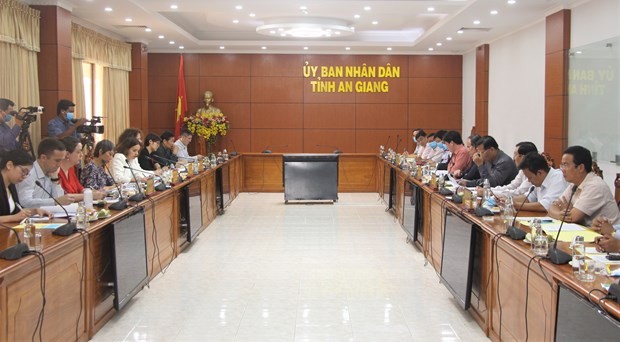(VOVWORLD) - The Mekong Delta province of An Giang has asked the World Bank and the Australian government to help build reservoirs in combination with irrigation infrastructure to serve production in the Long Xuyen quadrilateral sub-region.
 At the working session between the Mekong Delta province of An Giang and a delegation led by WB Country Director in Vietnam Carolyn Turk and Australian Ambassador in Vietnam Robyn Mudie. (Photo: VNA) At the working session between the Mekong Delta province of An Giang and a delegation led by WB Country Director in Vietnam Carolyn Turk and Australian Ambassador in Vietnam Robyn Mudie. (Photo: VNA) |
The large-scale reservoirs are critical to the sub-region as they supply fresh water for local residents in the dry season and regulate water resources for agricultural production, Chairman of the An Giang provincial People’s Committee Nguyen Thanh Binh told a working delegation led by WB Country Director in Vietnam Carolyn Turk and Australian Ambassador in Vietnam Robyn Mudie on Tuesday.
Binh proposed the WB and the Australian government help deal with land subsidence and river bank landslide and erosion, with priority on the relocation of households in areas vulnerable to erosion to safer places.
At the working session, Ambassador Mudie said the Australian government has provided the Mekong Delta region with 650 million USD to carry out sustainable economic development projects, including the Cao Lanh bridge in Dong Thap province as the largest project in ASEAN built with funds from the Australian government, thus promoting the socio-economic development of the region.
Mudie affirmed the Australian government, through the WB, will continue helping Mekong delta provinces, including An Giang, carry out water resource management and sustainable agricultural development projects.
WB Country Director in Vietnam Turk also affirmed the WB’s support for Mekong Delta localities to cope with climate change, especially the matters relating clean water and river bank erosion.
Thanks to assistance from the Australian government and WB, An Giang has implemented programmes and projects, contributing to local socio-economic development and poverty reduction efforts.
An Giang is located in the Mekong Delta’s key economic area, and the country’s key agricultural producer, with main products like rice, tra fish and fruits.
The province has been affected by climate change in recent years such as prolonged drought in the dry season, heavy rain in the rainy season, especially river and canal bank landslide and erosion.